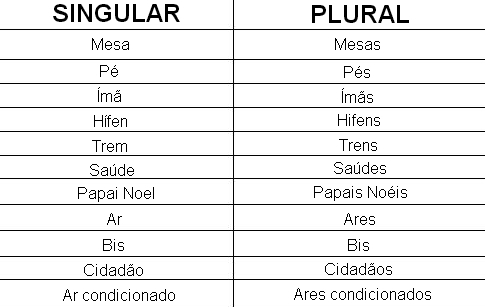Plural refers to everything that is composed of more than one element. In Portuguese, the plural is the numeral grammar class that expresses the variables formed by two elements on.
The use of the plural in the Portuguese language consists, as a rule, in the addition of the letter “s” at the end of a word in its singular form, especially when it is ended by a vowel.
Examples of plural words

Detail for the word "bis" which, as well as others ending with the letter "s", are considered pluralized even in its singular form, there being no change in its spelling, even with the alteration of the number (invariables).
Example: “He bought a pencil” (singular) / “He bought five pencils” (plural).
However, there are some special cases where the plural inflection of the word adds or changes the suffixes.
plural rules
- Words ending in vowels, oral diphthong and “n”, form plural with the addition of “s”. Exception: canon – canons.
- Words ending in “m”, form plural in “ns”.
- Words ending in “r” and “z” form the plural by adding “es”. Exception: character – characters.
- Words ending in “al”, “el”, “ol”, “ul” form a plural by changing the “l” to “is”. Exception: evil – evils / consul – consuls.
- Words ending in “il” form a plural in two ways: oxytone (in “is”) or paroxytone (in “eis”).
- Words ending in “s” form a plural in two ways: monosyllabic or oxytone (in “es) and paroxytone or proparoxytone (they are invariable).
- Words ending in “ão” form a plural in three ways: “ões”, “ães” and “ãos”.
- Words ending in “x” are invariant in the plural.
There are still several exceptions and special rules that must be followed according to a given grammatical context.
In a figurative sense, the term “plural” can also be related to the diversity or variety of something. Example: “The boy's arguments were quite plural”.
In English grammar, the use of plurals of nouns is called plural of nouns, and consists of a rule quite similar to the Portuguese language.
See also the meaning of plurality.
Plural and Singular
The singular is related to everything that is unique, while the plural consists of what is composed of more than one element.
Learn more about the meaning of singular and see about definite and indefinite article.
